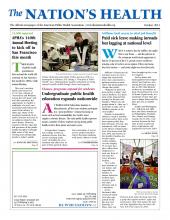Children with special health needs are at high risk of being obese and sedentary, and a lack of community resources may be to blame, a recent study found.
While the study only looked at a small pool of 23 children with special needs such as cerebral palsy and autism, the majority of those children were obese. The children also did not meet the recommended daily 60 minutes of physical activity and “engaged in more screen time than recommended.” A majority of the parents in the study said their children needed more supervision to participate in community-based sport and recreation programs.
The study found obesity was more likely among the children with cognitive, behavioral or emotional issues than those with physical and medical diagnoses. Such physical and medical diagnoses would include cerebral palsy, asthma and seizure disorders. Cognitive, behavioral, or emotional conditions include autism, mood disorders, attention deficit hyperactivity disorder and severe intellectual disabilities.
Previous studies have found that children with special health needs are at higher risk for being obese and sedentary. The new study, published Aug. 9 in International Journal of Pediatrics, noted that health promotion strategies for children with special needs “may not be addressed in primary care or in rehabilitation services due to time constraints and competing chronic and/or acute medical needs.” Yet promoting a healthy weight among such children is critical because chronic health conditions linked to obesity can lead to further health problems.
Also, children who are obese are more likely to be obese as adults, putting them at higher risk for such conditions as heart disease, diabetes and some cancers.
The study was conducted among children served by St. Christopher’s Hospital for Children in an area of Philadelphia that is the poorest neighborhood in the city and has the third highest poverty rate in the nation, at 45 percent. The area also has the second highest percentage of children living in single parent families, at 67 percent, and nearly half of all households had trouble putting enough food on the table in 2008–2010.
The study’s authors said their findings “may highlight the need for more accessible facilities, family and recreation or fitness staff training and adapted activities to provide safe, appropriate environments with sustained moderate-to-vigorous physical activity to result in improved health and weight status.” They also recommended further research looking at health outcomes and long-term health implications among children with special health care needs, particularly those living in underserved communities.
The study found that none of the children participated in the recommended 60 minutes of daily moderate-to-vigorous physical activity.
“In candid conversations during interview sessions, some parents spoke of their children not being able to fully participate in sports and recreation to the degree and competitive level of children with typical development,” the study’s authors wrote.
“In this study, parents identified multiple barriers to physical activity, with a lack of supervision in community programs being the most common concern,” the study’s authors wrote. “A majority of parents agreed that limited finances and inability to pay for adaptive equipment posed barriers to being able to participate in physical activities. Additionally parents identified multiple resources they needed in their community to promote physical activity for their children, including pools, gyms and summer camps.”
As is the case with all children, the children in the study engaged in more screen time than the one to two daily hours recommended by the American Academy of Pediatrics.
The study’s authors recommended that primary care physicians give families guidance on finding ways for children with special needs to find “healthy, active recreation.”
The study is online at http://www.ncbi.nlm.nih.gov/pmc/articles/PMC3352328/?tool=pubmed
- Copyright The Nation’s Health, American Public Health Association









